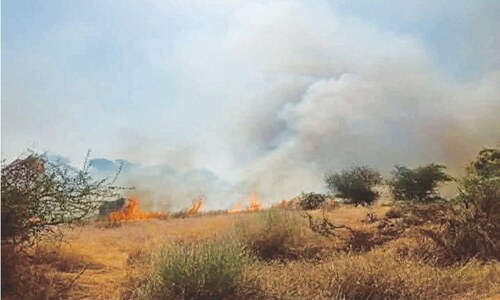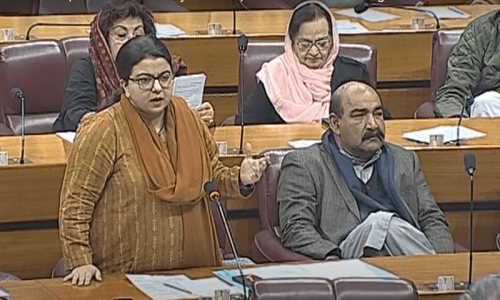ANGOOR ADDA: Pakistan is confident that a pair of nine-foot chicken wire fences topped with barbed wire will stop incursions by militants from Afghanistan, which opposes Islamabad’s plans for a barrier along the frontier.
Pakistan plans to fence up most of the 2,500km frontier despite Kabul’s protests that the barrier would divide families and friends along the Pashtun tribal belt straddling the colonial-era Durand line drawn up by the British in 1893.
Pakistan’s military estimates that it will need about Rs56 billion ($532 million) for the project, while there are also plans to build 750 border forts and employ high-tech surveillance systems to prevent militants crossing.
In the rolling hills of Angoor Adda village in South Waziristan, three rolls of barbed wire are sandwiched in the six-foot gap between the chicken wire fences.
“(The fence) is a paradigm change. It is an epoch shift in the border control management,” said a Pakistani army officer in command of South Waziristan during a presentation to foreign media on Wednesday. “There will not be an inch of international border (in South Waziristan) which shall not remain under our observation.”
Pakistan’s military has so far fenced off about 43km of the frontier, starting with the most violence-prone areas in the Federally Administered Tribal Areas (Fata), and is expected to recruit tens of thousands of new troops to man the border. It is not clear how long it will take to fence the entire boundary.
But Pakistan’s plans have also drawn criticism from across the border.
Gulab Mangal, governor of the eastern Afghan province of Nangarhar, said the wall would create “more hatred and resentment” between two neighbours and would do neither country any good.
“The fence will definitely create a lot of trouble for the people along the border on both sides but no wall or fence can separate these tribes,” he said. “I urge the tribes to stand against this action.”
Pakistan has blamed the Taliban it says are based on Afghan soil for a spate of attacks at home over the past year, urging Kabul to eradicate “sanctuaries” for militants.
Afghanistan, in turn, accuses Islamabad of sheltering the leadership of the Afghan Taliban militants who are battling the Western-backed government in Kabul.
Both countries deny aiding militants, but relations between them have soured in recent years. In May, the tension rose when 10 people were killed in two border villages in Balochistan.
But Pakistani officials insist they will finish the job as the country’s security rests on this fence.
“By the time we are done, Inshallah, we will be very sure of one thing: that nobody can cross this place,” said the Pakistani officer in charge of South Waziristan.
Published in Dawn, October 19th, 2017














































